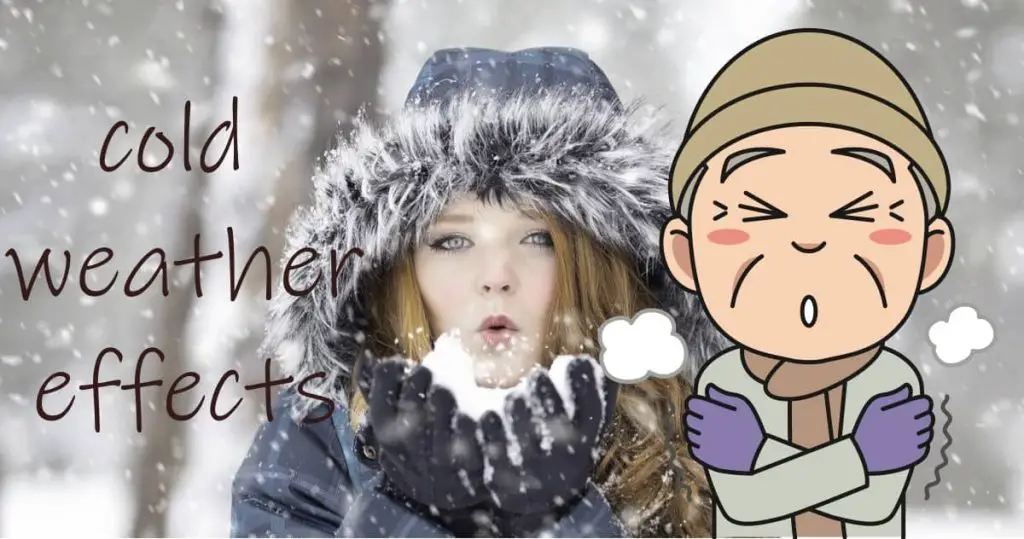
What are cold weather effects on the human body? This article discusses cold weather effects on human body processes, both negative and positive. Read on to find out.
Table of Contents
Introduction
The current concern about climate change has led to significant shifts in weather patterns worldwide. While some regions experience warmer temperatures, others face colder climates. In this article, we will look into the effects of cold weather on the human body, exploring both its negative and positive effects.
Cold weather can have a profound impact on our bodies, affecting various physiological processes and overall well-being. From increased risk of hypothermia to exacerbation of respiratory conditions, the negative effects of cold weather are diverse and can pose serious health risks. On the other hand, cold weather also has some surprising benefits, such as boosting metabolism and potentially improving sleep quality.
Let’s discuss this topic in more detail in the next sections.
5 Negative Cold Weather Effects on the Human Body
Cold weather can have significant negative effects on the human body, affecting various physiological processes and overall health. Understanding these effects is crucial for individuals to take necessary precautions and protect themselves during colder seasons.
Below are five negative effects of cold weather on the human body, along with detailed explanations of each effect:
1. Increased Risk of Hypothermia
One of the most serious consequences of exposure to cold weather is the increased risk of hypothermia. Hypothermia occurs when the body loses heat faster than it can produce it, leading to a dangerous drop in body temperature.
Symptoms of hypothermia include shivering, confusion, slurred speech, and drowsiness. In severe cases, hypothermia can be life-threatening, requiring immediate medical attention.
2. Exacerbation of Respiratory Conditions
Cold weather can worsen respiratory conditions, such as asthma and chronic obstructive pulmonary disease (COPD). The cold, dry air can irritate the airways, leading to inflammation and constriction of the bronchial tubes. This can cause difficulty breathing, coughing, wheezing, and chest tightness. Individuals with respiratory conditions should take extra precautions during cold weather to prevent exacerbations and manage their symptoms effectively.
3. Increased Risk of Heart Problems
Individuals with underlying heart conditions should be cautious in cold weather and follow their healthcare provider’s recommendations to protect their heart health.
Cold weather can put added stress on the cardiovascular system, increasing the risk of heart problems such as heart attacks and strokes. The cold temperatures can cause blood vessels to constrict, raising blood pressure and making the heart work harder to pump blood throughout the body.
4. Dry and Irritated Skin
Exposure to cold weather can lead to dry, irritated skin, especially on exposed areas such as the face, hands, and feet. The low humidity levels and harsh winds can strip the skin of its natural oils, causing it to become dry, flaky, and itchy.
To prevent skin damage in cold weather, it is essential to moisturize regularly, wear protective clothing, and avoid prolonged exposure to extreme temperatures.
5. Seasonal Affective Disorder (SAD)
Cold weather and shorter daylight hours can contribute to the development of seasonal affective disorder (SAD), a type of depression that occurs at a specific time of year, usually in the winter months. Symptoms of SAD may include low mood, fatigue, irritability, and changes in sleep and appetite. Treatment for SAD may involve light therapy, counseling, medication, and lifestyle changes to help manage symptoms and improve overall well-being.
When people understand how cold weather affects the human body, they can take proactive steps to protect themselves and minimize the dangers of colder environments. Prioritizing proper clothing, staying warm, maintaining good respiratory health, and seeking medical attention when needed are essential strategies for staying healthy and safe during the winter months.
5 Positive Cold Weather Effects on the Human Body
While cold weather is often associated with negative impacts on the human body, it also brings about several positive effects that can benefit our health and well-being. Understanding these positive effects can help us appreciate the unique ways in which our bodies respond to colder temperatures.
1. Boosted Immune System
According to Brenner et al. (1999), exposure to cold weather strengthens the immune system. When we expose our bodies to colder temperatures, our bodies work harder to maintain a stable internal temperature, which can stimulate the immune system. This increased immune activity may help the body fend off infections and illnesses more effectively, potentially reducing the risk of falling sick during the winter months.
2. Improved Sleep Quality
Cold weather can have a positive impact on sleep quality for some individuals. Cooler temperatures are often conducive to better sleep (Cao et al., 2021), as they can help regulate body temperature and create a more comfortable sleeping environment. The longer nights during the winter months can promote deeper, more restful sleep, leading to improved overall sleep quality and better daytime functioning.
3. Calorie Burning and Weight Loss
In colder weather, our bodies need to work harder to maintain a stable core temperature, which can cause increased calorie expenditure. Shivering, a natural response to cold temperatures, can help burn additional calories as the body generates heat to stay warm. This increased energy expenditure, coupled with potential outdoor activities like winter sports, can contribute to calorie burning and potentially support weight loss goals.
4. Enhanced Mood and Mental Well-Being
Cold weather has been associated with mood improvement and enhanced mental well-being for some individuals. The crisp, fresh air and bright winter landscapes can have a rejuvenating effect on mood, helping to alleviate stress and boost overall mental health (aan et al., 2008).
Additionally, outdoor activities in the snow, such as skiing or ice skating, can provide opportunities for physical exercise and social interaction, further enhancing mood and well-being.
5. Improved Skin Condition
While cold weather can lead to dry and irritated skin, it can also have positive effects on skin health. Cold temperatures can help reduce inflammation and redness in the skin, making it appear smoother and more radiant. Additionally, the cold air can help tighten pores and reduce oil production, potentially improving the appearance of acne-prone skin. Proper skincare routines tailored to the winter months can help maintain skin hydration and health.
By recognizing and appreciating the positive effects of cold weather on the human body, individuals can make the most of the unique opportunities that colder seasons offer for health and well-being. From boosting the immune system to enhancing mood and skin health, cold weather can have beneficial effects that contribute to overall wellness and vitality.
Conclusion
Summarizing the effects of cold weather on the human body reveals a complex interplay between negative and positive effects. While cold weather can pose challenges such as increased risk of illnesses and skin dryness, it also offers notable benefits. The boosted immune system response to colder temperatures can enhance overall health by reducing the likelihood of infections.
Additionally, improved sleep quality during colder nights can lead to better daytime functioning and mental well-being. Calorie burning and weight loss may also be facilitated by the body’s efforts to maintain core temperature in cold weather, potentially supporting fitness goals.
Furthermore, the mood-enhancing and skin-improving effects of cold weather activities and environments can contribute to a sense of well-being and vitality. By recognizing and embracing these positive effects, individuals can navigate the winter months with a focus on optimizing their health and enjoying the unique benefits that cold weather can bring.
References
aan het Rot, M., Moskowitz, D. S., & Young, S. N. (2008). Exposure to bright light is associated with positive social interaction and good mood over short time periods: A naturalistic study in mildly seasonal people. Journal of psychiatric research, 42(4), 311-319.
Brenner, I. K. M., Castellani, J. W., Gabaree, C., Young, A. J., Zamecnik, J., Shephard, R. J., & Shek, P. N. (1999). Immune changes in humans during cold exposure: effects of prior heating and exercise. Journal of Applied Physiology.
Cao, T., Lian, Z., Ma, S., & Bao, J. (2021). Thermal comfort and sleep quality under temperature, relative humidity and illuminance in sleep environment. Journal of Building Engineering, 43, 102575.


